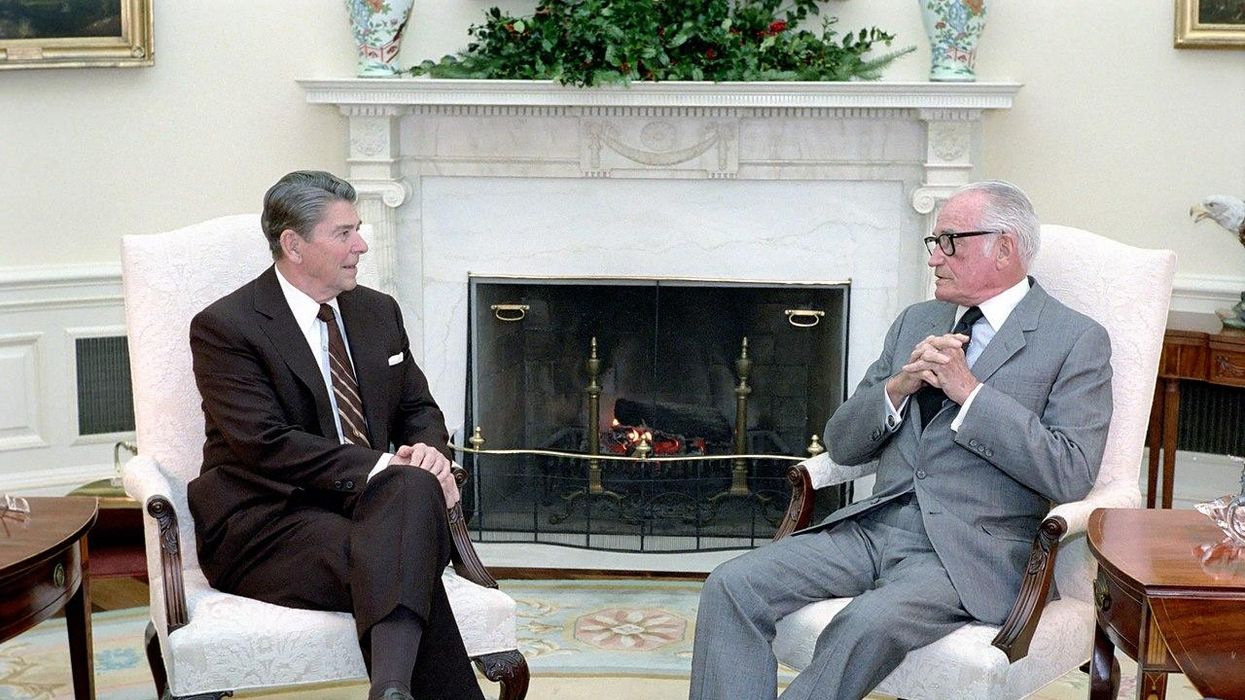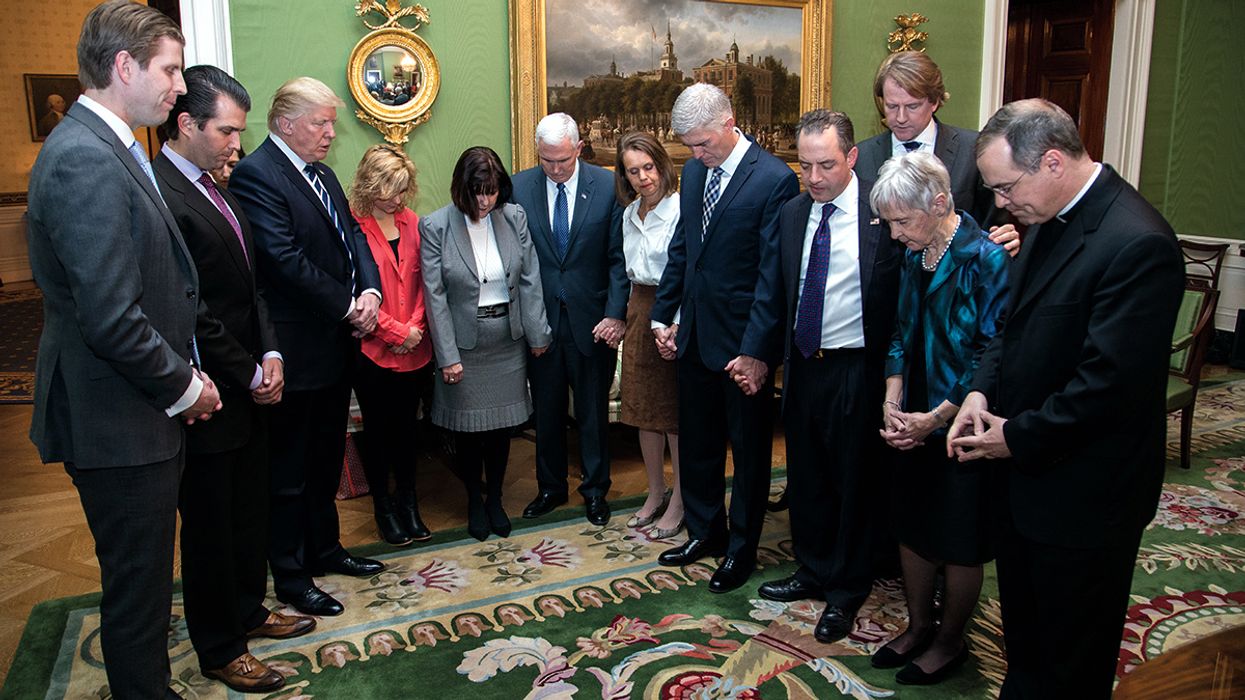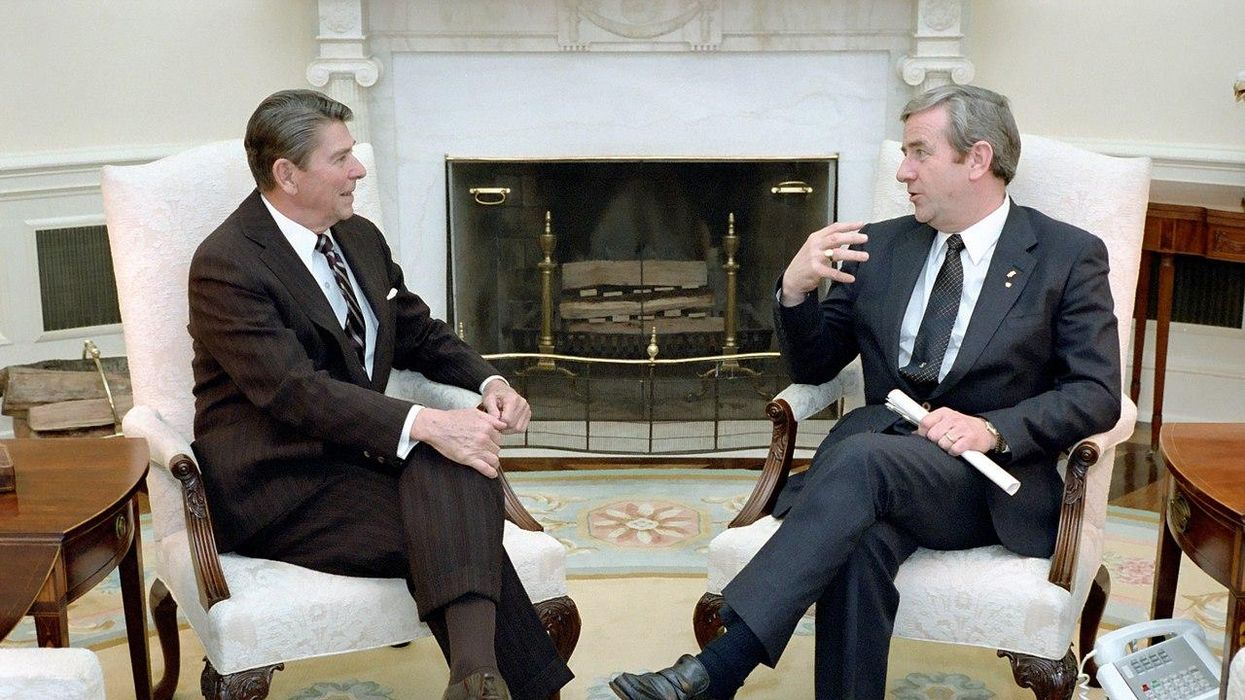How the GOP's 'folk libertarians' and 'cynical irreligious right' clashed in the midterms: historian

Image via Creative Commons.
Alex Henderson November 23, 2022
When the Christian Right movement associated with White evangelical fundamentalists like Pat Robertson, Jimmy Swaggart, James Dobson and the Moral Majority’s Jerry Falwell, Sr. became prominent in the Republican Party in the early 1980s, one of the United States’ most influential conservatives expressed total disdain for the movement. The late Republican Sen. Barry Goldwater of Arizona, railing against Falwell, made it abundantly clear that he believed the Christian Right was bad for the GOP and bad for conservatism.
Ironically, the arch-conservative Goldwater found himself in agreement with the American Civil Liberties Union (ACLU) and shared their view that the last thing the U.S. needed was to become the type of theocracy that Falwell and other evangelicals wanted the U.S. to become. Goldwater, the ACLU and television producer Norman Lear’s People For the American Way weren’t anti-religion but rather, realized that a strong separation of church and state was necessary to protect religious freedom.
Falwell and Goldwater were both part of President Ronald Reagan’s fragile right-wing coalition of the 1980s, but the animosity between the two Republicans was considerable. And that tension between the secular right and the fundamentalist right continues to exist in 2022.
READ MORE: How Moral Majority founder Jerry Falwell, Sr. helped pave the way for Trumpism and the white nationalist horrors of the Trump era
In a think piece published by The Bulwark on November 22, historian Joshua Tait takes an in-depth look at the secular/fundamentalist rivalry on the American right — a rivalry that, according to Tait, is as intense as ever.
“On the illiberal right, there’s a divide between religiously motivated conservatives and their secular allies,” Tait explains. “This divide will likely grow, and be felt at both the elite and popular levels. In one sense, this is not new: There has long been a religious/secular fault line in the conservative coalition. But as hypocritical as the Religious Right can be, religious — generally Christian — impulses have, at times, tempered American conservatism. Now, however, we already see signs of a cynical irreligious right and how its ideas and attitudes have infected politically minded believers.”
According to Tait, trying to get the secular right and the fundamentalist right to find common ground is as difficult in 2022 as it was during the 1980s when Goldwater vowed to “fight” the Christian Right “every step of the way if they try to dictate their moral convictions to all Americans in the name of ‘conservatism.’” Tait emphasizes that although “folk libertarians” are quick to express their contempt for “woke” ideology, that doesn’t automatically make them allies of the Christian Right.
“It’s hard to imagine that religious conservatives’ eternal commitments and their genuine belief in sin will allow for any sort of long-term alliance,” Tait argues. “As soon as Christians are perceived as a more censorious threat, the folk-libertarian impulse of this cohort will swing left, as we saw in the midterms.”

Image via Creative Commons.
Alex Henderson November 23, 2022
When the Christian Right movement associated with White evangelical fundamentalists like Pat Robertson, Jimmy Swaggart, James Dobson and the Moral Majority’s Jerry Falwell, Sr. became prominent in the Republican Party in the early 1980s, one of the United States’ most influential conservatives expressed total disdain for the movement. The late Republican Sen. Barry Goldwater of Arizona, railing against Falwell, made it abundantly clear that he believed the Christian Right was bad for the GOP and bad for conservatism.
Ironically, the arch-conservative Goldwater found himself in agreement with the American Civil Liberties Union (ACLU) and shared their view that the last thing the U.S. needed was to become the type of theocracy that Falwell and other evangelicals wanted the U.S. to become. Goldwater, the ACLU and television producer Norman Lear’s People For the American Way weren’t anti-religion but rather, realized that a strong separation of church and state was necessary to protect religious freedom.
Falwell and Goldwater were both part of President Ronald Reagan’s fragile right-wing coalition of the 1980s, but the animosity between the two Republicans was considerable. And that tension between the secular right and the fundamentalist right continues to exist in 2022.
READ MORE: How Moral Majority founder Jerry Falwell, Sr. helped pave the way for Trumpism and the white nationalist horrors of the Trump era
In a think piece published by The Bulwark on November 22, historian Joshua Tait takes an in-depth look at the secular/fundamentalist rivalry on the American right — a rivalry that, according to Tait, is as intense as ever.
“On the illiberal right, there’s a divide between religiously motivated conservatives and their secular allies,” Tait explains. “This divide will likely grow, and be felt at both the elite and popular levels. In one sense, this is not new: There has long been a religious/secular fault line in the conservative coalition. But as hypocritical as the Religious Right can be, religious — generally Christian — impulses have, at times, tempered American conservatism. Now, however, we already see signs of a cynical irreligious right and how its ideas and attitudes have infected politically minded believers.”
According to Tait, trying to get the secular right and the fundamentalist right to find common ground is as difficult in 2022 as it was during the 1980s when Goldwater vowed to “fight” the Christian Right “every step of the way if they try to dictate their moral convictions to all Americans in the name of ‘conservatism.’” Tait emphasizes that although “folk libertarians” are quick to express their contempt for “woke” ideology, that doesn’t automatically make them allies of the Christian Right.
“It’s hard to imagine that religious conservatives’ eternal commitments and their genuine belief in sin will allow for any sort of long-term alliance,” Tait argues. “As soon as Christians are perceived as a more censorious threat, the folk-libertarian impulse of this cohort will swing left, as we saw in the midterms.”
It's not just Trump: Midterms show the religious right is an albatross around the GOP’s neck

Image via The White House.
Amanda Marcotte and
Salon November 22, 2022

Image via The White House.
Amanda Marcotte and
Salon November 22, 2022
A couple of weeks out from a midterm election in which Republicans dramatically underperformed, one major theme has emerged in the post-mortems: Donald Trump is to blame. Turns out that voters do not like efforts to overthrow democracy, like Trump's attempted coup or the January 6 insurrection. As data analyst Nate Cohn at the New York Times demonstrated, Trump's "preferred primary candidates" — who usually won a Trump endorsement by backing his Big Lie — fell behind "other G.O.P. candidates by about five percentage points." The result is a number of state, local and congressional offices were lost that Republicans might otherwise have won.
Republican leaders are struggling with this information because dumping Trump is easier said than done so long as he has a substantial percentage of their voting base in his thrall. But, in truth, Republican problems run even deeper than that. It's not just Trump. The religious right has been the backbone of the party for decades, but this midterm election shows they might now be doing the GOP more harm than good at the ballot box.
As with Trump, Republicans are in a "can't win with them/can't win without them" relationship with the religious right. Fundamentalists remain a main source of organizing and fundraising for the GOP, as well a big chunk of their most reliable voters. They can't afford to alienate this group any more than they can afford to push away Trump. Doing so risks the loss of millions of loyal voters. But by continuing to pander to the religious right, Republicans are steadily turning off all other voters, a group that's rapidly growing in size as Americans turn their backs on conservative Christianity. That's doubly true when one looks at the youngest voters, the ones Republicans will need to stay viable as their currently aging voter base starts to die off.
New data from the progressive polling firm Navigator Research shows how dire the situation is for Republicans. On "culture war" issues like reproductive rights and LGBTQ equality, the voters broke hard on the progressive side of things. Among Democratic voters this midterm, 48% said abortion was an important issue for them, showing strong pro-choice sentiment. But among Republicans, only 13% ranked abortion (and the banning of it) as a driving factor in their vote. When Democratic voters were asked their main reason for their voting choice this year, abortion rights was the most popular, cited by 49% of voters. But among Republican voters, only 24% cited support for abortion bans as a major factor.
Republican politicians may have been circumspect in talking about their anti-abortion views prior to Election Day, hoping to make the issue less salient to swing voters. But overall, the past two years have been heavily defined by Republicans catering to the religious right. It's not just that the GOP-controlled Supreme Court went out of its way to overturn Roe v. Wade this past June. Republican leadership in state governments rushed forward to ban abortion, to the point where the red states seemed to be competing over how draconian their abortion bans could be.

Nor were the attacks on reproductive health care limited to abortion. In July, the House of Representatives voted on a bill to codify contraception rights so state governments couldn't ban birth control. All but eight Republicans voted to allow contraception bans. Democratic fears about legal contraception are not misplaced, either. Last week, ProPublica leaked audio of a meeting between anti-choice activists and Republican legislators in Tennessee, where the assembled can be heard gaming out their next steps to ban female-controlled forms of contraception.
The situation was similarly dire on the LGBTQ front, as Republican politicians raced to oppress queer and trans people, especially kids. In Florida, Gov. Ron DeSantis championed the "don't say gay" law that forces queer teachers and students into the closet. In Texas, Gov. Greg Abbott menaced parents who accept a child's trans identity by threatening to use Child Protective Services to break up their families. Republicans keep passing laws blocking trans people from receiving health care or playing on sports teams. In addition, there's been a dramatic rise in conservatives attempting to ban books featuring LGBTQ characters.
This rash of queerphobic policy has been accompanied by an escalation of bigoted rhetoric in right wing media, all aimed at painting LGBTQ people as perverts and child predators. From Fox News on down the entire conservative media ecosystem, it's become routine to accuse queer people of being "groomers," which is a not-especially-oblique way to call them child molesters. Groups like the Proud Boys routinely target drag shows with intimidating "protests," which are starting to get violent. Over the weekend, there was a gun massacre at a gay club in Colorado Springs. While the police are still not speaking publicly about the killer's motive, observers have pointed out that the murders happened mere hours before a drag brunch, the kind of event that conservative groups have been targeting for harassment.
All of this ugliness did not help Republicans in the midterms. On the contrary, it appears to have hurt them, especially with such high youth voter turnout. As a national youth poll run by Harvard shows, younger people reject the fundamentalism that animates the Republican party. Only 12% identify as "fundamentalist/evangelical," while 37% — by far the biggest group — say they have no religious preference at all. This comports with other polling that shows that Christian churches are becoming older and smaller all the time, as young people leave in droves. Overall, 71% of Americans support same-sex marriage. About two-thirds of Americans want abortion to remain legal.
Even among Republican voters, the religious right doesn't seem particularly popular. Along with the low enthusiasm for abortion bans, the Navigator poll shows that Republican voters weren't super interested in anti-LGBTQ policy positions. Only 20% of those voters cited anti-trans views as a motivator in voting this year, despite nearly two years of non-stop right wing propaganda on this subject. The top three issues that got GOP voter juices going were opposition to social welfare spending, demands that government be "tough on crime" and anger over immigration. In other words, they were all proxy issues for white grievances about a racially diverse society. The Republican party still appeals to racist voters, but even they've lost the enthusiasm for being the panty police.
Despite this hard, statistical evidence, religious right activists refuse to accept that their extremism is hurting the Republican party. As Rachel Cohen of Vox explained last week, anti-abortion leaders insist that banning abortion is a winning issue for Republicans. Instead, as Politico reported, they're claiming that it was Republicans who failed by supposedly "not running harder on abortion restrictions."
Whether these arguments are delusional or simply bad faith hardly matters. The desperation is palpable. Christian conservatives are used to the Republican party being dependent on them, and therefore bending over backward to please them. But this data shows that pandering to the religious right might be hurting the GOP more than helping. Fundamentalists are learning they're just as dependent on the Republican party as the GOP is on them. No wonder they're doubling down. As more and more people leave their pews, their only foothold in staying relevant is to maintain control over the Republican party. As with Trump, they will not leave quietly, but continue to hold the GOP hostage to their increasingly unpopular agenda.
This 1980 report, 42 years later, sheds light on the Christian nationalist extremism of 2022

Image via Creative Commons.
Alex Henderson November 21, 2022
On August 24, 1980, the Washington Post published a report by journalist Kathy Sawyer that took a close look at what was, at the time, a new phenomenon on the right: the alliance of far-right White evangelicals and the Republican Party. And 42 years later, in 2022, Sawyer’s reporting sheds light on a movement that, critics argue, is unapologetically authoritarian in nature — a movement that has made considerable advances since then.
When Sawyer’s article was published, President Jimmy Carter was running for reelection; in November 1980, he suffered a landslide defeat at the hands of Republican former California Gov. Ronald Reagan, who turned out to be the most influential U.S. president since Franklin Delano Roosevelt. From 1932 (the year in which FDR was elected) until 1980, liberalism arguably dominated the political conversation in the United States. But Reagan’s victory over Carter pushed the U.S. in a much more conservative direction. All of the Democratic presidents elected after the 1980s have been centrists — Bill Clinton, Barack Obama and Joe Biden — and the U.S. hasn’t had a staunch liberal in the White House since President Lyndon B. Johnson in the 1960s.
As president, Reagan oversaw a fragile right-wing coalition that included everyone from far-right evangelicals to fiscal conservatives to libertarians. The Reagan coalition was by no means one big happy family, and ultimately, White evangelicals became much more influential in the Republican Party than than the libertarians they despised.
READ MORE: After Trump, Christian nationalist ideas are going mainstream – despite a history of violence

Sawyer’s report vividly describes the progress that White fundamentalist evangelicals like James Robison and the Rev. Jerry Falwell, Sr. were making in the GOP in August 1980. Reporting from Texas, Sawyer explained, “Evangelist leaders joined forces with conservative politicians here last week in exhorting millions of non-voting Christians to ‘crawl out from under those padded pews’ and take up political arms in the equivalent of a moral war to save America. The two-day gathering in the brimstone shimmer of 105-degree Texas heat was billed sedately as The National Affairs Briefing. But it was really a fusion of Bible-thumping revivalist oratory with hardline New Right politics. Its goal: to get godly conservatives elected to offices high and low across the land.”
Sawyer described a speech by Robeson in Texas, who railed against “perverts, radicals, leftists, communists, liberals and humanists" and declared, “Not voting is a sin against Almighty God.”
Sawyer reported, “The crowd heard speakers ranging from Phyllis Schlafly, anti-feminist leader of the Stop ERA movement, to a general who predicted a nuclear holocaust within a decade if America does not ‘turn to God’ and beef up military defenses against godless communism. The repentant son of atheist crusader Madelyn Murray O'Hair urged that prayer be returned to the schools. Champions of the anti-abortion National Right to Life Committee promoted their cause. And throughout, attentions swung wildly from theology and scripture to instruction on how to organize without violating tax laws, the practicalities of registering a congregation to vote during the Sunday service and the importance of keeping a ‘moral score card’ on the voting record of elected representatives.”
Sawyer noted that the August 1980 event in Texas “grew out of the fledgling movement founded largely by radio and television preachers such as Jerry Falwell of Lynchburg, Va.”
READ MORE: How Moral Majority founder Jerry Falwell, Sr. helped pave the way for Trumpism and the white nationalist horrors of the Trump era
“The movement, however, has yet to demonstrate a significant ability to turn out the born-again vote,” Sawyer reported. “But it has shown enough promise to draw presidential nominee Reagan as a speaker Friday night in an appeal for Christian support. Reagan tried to avoid getting specific on such flammable topics as homosexual rights, abortion and the Equal Rights Amendment during his stopover here.”
But even though Sawyer described the Christian Right as a “fledgling movement” in her article, that movement had its share of scathing critics in the early ‘80s — critics who hoped to nip it in the bud. And they were both liberal and conservative.
Liberal television producer Norman Lear — who gave us politically minded 1970s sitcoms like “All in the Family,” “Maude,” “Good Times” and “The Jeffersons” — founded People For the American Way in 1980 in response to the threat that the Christian Right posed. And on the right, conservative Republican Sen. Barry Goldwater of Arizona made no secret of his disdain for the movement, which he believed was terrible for the GOP and terrible for the conservative movement. Liberal Lear and conservative Goldwater disagreed on many things, but they were on the same page when it came to saying that the U.S. needed to maintain a robust separation of church and state.
Goldwater viewed the Christian Right as a Pandora’s box, and just as he feared, the movement has only tightened its grip on the Republican Party — especially with the rise of Donald Trump and the MAGA movement. Presidents Reagan, George H.W. Bush and George W. Bush were allies of far-right White evangelicals, but Trump has been much more inflammatory when speaking to them. Trump, who was only 34 when Sawyer’s article was published, repeatedly tells his evangelical and Christian nationalist supporters that Democrats pose an existential threat to Christianity in the U.S.
Of course, plenty of Democrats are churchgoing Christians. Centrist President Joe Biden is a devout Catholic; Sen. Raphael Warnock is a Protestant minister. Barack Obama, a Mainline Protestant, has quoted scripture much more often than Trump. But the Christian Right believes that only evangelical fundamentalists are true Christians.
When the Post published Sawyer’s article, White evangelicals were railing against Roe v. Wade but knew that there weren’t enough socially conservative U.S. Supreme Court justices to overturn it. But eventually, the Christian Right got the socially conservative Supreme Court it was hoping for. With the High Court’s 2022 ruling in Dobbs v. Jackson Women’s Health Organization, Roe v. Wade was overturned after 49 years. And Justice Clarence Thomas made it clear that he would also like to see the Court “reconsider” rulings that offered protections for contraception (1965’s Griswold v. Connecticut), same-sex marriage (2015’s Obergefell v. Hodges) and gay relationships (2003’s Lawrence v. Texas).
In October, megachurch pastor Robert Jeffress called for “Christian nationalists” to “impose their values” on nonbelievers whether they liked it or not. In 2021, Michael Flynn, former national security adviser in the Trump Administration, called for the U.S. to “embrace one religion” and has made it clear that he believes religions other than Christianity should be illegal. And far-right Rep. Lauren Boebert of Colorado, in June 2022, declared, “The church is supposed to direct the government. The government is not supposed to direct the church. That is not how our Founding Fathers intended it…. I’m tired of this separation of church and state junk.”
Forty-two years after Sawyer’s article was published, the Christian Right is not a marginal part of the Republican Party. It is a sizable GOP voting block — especially in red states — that many Republicans are afraid to criticize. And the movement, feeling empowered by the MAGA movement and the Dobbs decision, is showing no signs of backing down.
READ MORE: Texas pastor openly calls on 'Christian nationalists' to 'impose their values on society'

Image via Creative Commons.
Alex Henderson November 21, 2022
On August 24, 1980, the Washington Post published a report by journalist Kathy Sawyer that took a close look at what was, at the time, a new phenomenon on the right: the alliance of far-right White evangelicals and the Republican Party. And 42 years later, in 2022, Sawyer’s reporting sheds light on a movement that, critics argue, is unapologetically authoritarian in nature — a movement that has made considerable advances since then.
When Sawyer’s article was published, President Jimmy Carter was running for reelection; in November 1980, he suffered a landslide defeat at the hands of Republican former California Gov. Ronald Reagan, who turned out to be the most influential U.S. president since Franklin Delano Roosevelt. From 1932 (the year in which FDR was elected) until 1980, liberalism arguably dominated the political conversation in the United States. But Reagan’s victory over Carter pushed the U.S. in a much more conservative direction. All of the Democratic presidents elected after the 1980s have been centrists — Bill Clinton, Barack Obama and Joe Biden — and the U.S. hasn’t had a staunch liberal in the White House since President Lyndon B. Johnson in the 1960s.
As president, Reagan oversaw a fragile right-wing coalition that included everyone from far-right evangelicals to fiscal conservatives to libertarians. The Reagan coalition was by no means one big happy family, and ultimately, White evangelicals became much more influential in the Republican Party than than the libertarians they despised.
READ MORE: After Trump, Christian nationalist ideas are going mainstream – despite a history of violence

Sawyer’s report vividly describes the progress that White fundamentalist evangelicals like James Robison and the Rev. Jerry Falwell, Sr. were making in the GOP in August 1980. Reporting from Texas, Sawyer explained, “Evangelist leaders joined forces with conservative politicians here last week in exhorting millions of non-voting Christians to ‘crawl out from under those padded pews’ and take up political arms in the equivalent of a moral war to save America. The two-day gathering in the brimstone shimmer of 105-degree Texas heat was billed sedately as The National Affairs Briefing. But it was really a fusion of Bible-thumping revivalist oratory with hardline New Right politics. Its goal: to get godly conservatives elected to offices high and low across the land.”
Sawyer described a speech by Robeson in Texas, who railed against “perverts, radicals, leftists, communists, liberals and humanists" and declared, “Not voting is a sin against Almighty God.”
Sawyer reported, “The crowd heard speakers ranging from Phyllis Schlafly, anti-feminist leader of the Stop ERA movement, to a general who predicted a nuclear holocaust within a decade if America does not ‘turn to God’ and beef up military defenses against godless communism. The repentant son of atheist crusader Madelyn Murray O'Hair urged that prayer be returned to the schools. Champions of the anti-abortion National Right to Life Committee promoted their cause. And throughout, attentions swung wildly from theology and scripture to instruction on how to organize without violating tax laws, the practicalities of registering a congregation to vote during the Sunday service and the importance of keeping a ‘moral score card’ on the voting record of elected representatives.”
Sawyer noted that the August 1980 event in Texas “grew out of the fledgling movement founded largely by radio and television preachers such as Jerry Falwell of Lynchburg, Va.”
READ MORE: How Moral Majority founder Jerry Falwell, Sr. helped pave the way for Trumpism and the white nationalist horrors of the Trump era
“The movement, however, has yet to demonstrate a significant ability to turn out the born-again vote,” Sawyer reported. “But it has shown enough promise to draw presidential nominee Reagan as a speaker Friday night in an appeal for Christian support. Reagan tried to avoid getting specific on such flammable topics as homosexual rights, abortion and the Equal Rights Amendment during his stopover here.”
But even though Sawyer described the Christian Right as a “fledgling movement” in her article, that movement had its share of scathing critics in the early ‘80s — critics who hoped to nip it in the bud. And they were both liberal and conservative.
Liberal television producer Norman Lear — who gave us politically minded 1970s sitcoms like “All in the Family,” “Maude,” “Good Times” and “The Jeffersons” — founded People For the American Way in 1980 in response to the threat that the Christian Right posed. And on the right, conservative Republican Sen. Barry Goldwater of Arizona made no secret of his disdain for the movement, which he believed was terrible for the GOP and terrible for the conservative movement. Liberal Lear and conservative Goldwater disagreed on many things, but they were on the same page when it came to saying that the U.S. needed to maintain a robust separation of church and state.
Goldwater viewed the Christian Right as a Pandora’s box, and just as he feared, the movement has only tightened its grip on the Republican Party — especially with the rise of Donald Trump and the MAGA movement. Presidents Reagan, George H.W. Bush and George W. Bush were allies of far-right White evangelicals, but Trump has been much more inflammatory when speaking to them. Trump, who was only 34 when Sawyer’s article was published, repeatedly tells his evangelical and Christian nationalist supporters that Democrats pose an existential threat to Christianity in the U.S.
Of course, plenty of Democrats are churchgoing Christians. Centrist President Joe Biden is a devout Catholic; Sen. Raphael Warnock is a Protestant minister. Barack Obama, a Mainline Protestant, has quoted scripture much more often than Trump. But the Christian Right believes that only evangelical fundamentalists are true Christians.
When the Post published Sawyer’s article, White evangelicals were railing against Roe v. Wade but knew that there weren’t enough socially conservative U.S. Supreme Court justices to overturn it. But eventually, the Christian Right got the socially conservative Supreme Court it was hoping for. With the High Court’s 2022 ruling in Dobbs v. Jackson Women’s Health Organization, Roe v. Wade was overturned after 49 years. And Justice Clarence Thomas made it clear that he would also like to see the Court “reconsider” rulings that offered protections for contraception (1965’s Griswold v. Connecticut), same-sex marriage (2015’s Obergefell v. Hodges) and gay relationships (2003’s Lawrence v. Texas).
In October, megachurch pastor Robert Jeffress called for “Christian nationalists” to “impose their values” on nonbelievers whether they liked it or not. In 2021, Michael Flynn, former national security adviser in the Trump Administration, called for the U.S. to “embrace one religion” and has made it clear that he believes religions other than Christianity should be illegal. And far-right Rep. Lauren Boebert of Colorado, in June 2022, declared, “The church is supposed to direct the government. The government is not supposed to direct the church. That is not how our Founding Fathers intended it…. I’m tired of this separation of church and state junk.”
Forty-two years after Sawyer’s article was published, the Christian Right is not a marginal part of the Republican Party. It is a sizable GOP voting block — especially in red states — that many Republicans are afraid to criticize. And the movement, feeling empowered by the MAGA movement and the Dobbs decision, is showing no signs of backing down.
READ MORE: Texas pastor openly calls on 'Christian nationalists' to 'impose their values on society'



